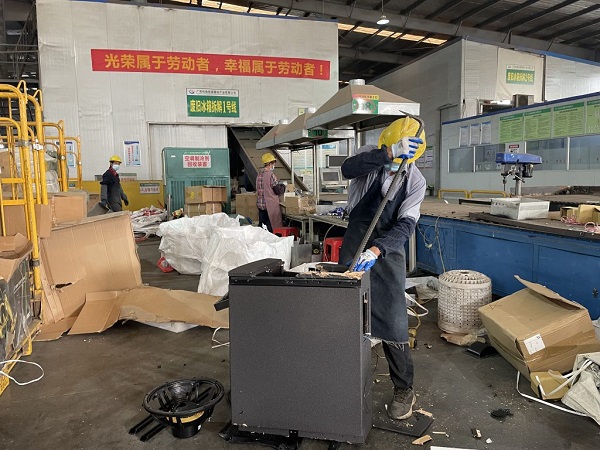Crime doesn’t play
There’s no denying the craftsmanship that goes into building high quality speakers, but what if someone was taking shortcuts and sticking your company’s badge on the front of a knock-off? Anna Hayes spoke to L-Acoustics’ Anti-Counterfeiting Task Force.
In February of this year, a counterfeiting operation was busted in China and members of the General Administration of Customs of the People’s Republic of China (GACC) had a smashing time when they destroyed the offending items.
This operation was carried out by the Chinese customs unit, working off of information from the L-Acoustics Anti-Counterfeiting Task Force, a unit that is still in the infancy of its existence. The speakers in question were being passed off as ARCS IIs, one of L-Acoustics’ models.
L-Acoustics’ legal counsel Laurent Ostojski, in thanking the Youyiguan Customs team and the company’s local counsel, Wanhuida, said it was one small step in their anti-counterfeiting initiative and they were poised to take legal action against any future such incursions.
ADVERTISEMENT
The company’s director of market intelligence, Stephane Ecalle, says that the counterfeit products can be deceptively similar to their brand on the outside but, in reality, are made with poor quality components, marketed without warranty, service or certification and can, in some cases, even be dangerous.
“The role of our task force is not only to defend our intellectual property by constantly monitoring the market, but also to alert the public on safety risks for users, and the legal risks associated with ownership or resale of counterfeits.”
Counterfeiting is not a new problem in the audio industry but as brands grow their presence and global recognition, they become targets for imitation. At L-Acoustics, the subject was under the watchful of the legal department until just over a year ago.
Laurent says: “We realised that a cross-discipline approach involving team members throughout L-Acoustics was necessary to better act to root out the problem. The task force includes experts from Sales, Application, Service, Legal, Communications and R&D, coordinated by Stephane Ecalle and myself.”
Laurent says that, alongside the growing flux of international trading, counterfeiting was becoming more visible and more viable via the internet and social media, making it important for his company to act to ensure that end users would not be duped into buying inferior replica products.
Though, he points out, that some users didn’t seem to consider buying replicas that big of a deal.
“Apart from economical and welfare damages (job destructions, tax evasion, working conditions, etc), using fake products can also put users and audience alike at risk from low performance, unexpected shutdowns, electric fires, or even physical damages resulting from defective rigging.”
He adds that, from country to country, counterfeiting may not always be considered a criminal offence but, in some cases, even owning or using a fake product can be enough to have the product seized and a fine/prison sentence imposed on the owner, even if they are not the maker of the product.
L-Acoustics products, he says, are subject to systematic testing and, depending on the product, may be subject to official certifications. Rigging, for example, is subject to mandatory TUV regulations in Germany.
“Legitimate manufacturers comply with these requirements, that is most certainly not the case for counterfeiters. As a result, should an administrative safety inspection occur on a venue or production using counterfeit products, national authorities may cancel a show, even at the last minute.”
He adds that that they had seen scenarios where fake products had failed due to electrical overload, pointing out that their products will include a number of protections against such occurrences as well as abiding by various other quality standards.
There is also the very real threat of material damages, Laurent says, pointing out that cheaper products user cheaper components, faulty assembly and lack of general protection.
“Furthermore, professional loudspeakers and subwoofers are heavy products which are often hung in the air, above the stage. Should fake, uncertified rigging break, line arrays could fall onto the crowd.”
Counterfeits have no warranty, no service and no resale value.
It’s hardly surprising that the aforementioned sting operation took place in China, given its reputation as the assembly workshop of the world. But Laurent says that counterfeiting is a global issue and they have instigated actions in other parts of the world including Europe and Latin America.
However, they do know that more than 90% of the fake L-Acoustics products are produced in China. The company itself manufactures in western Europe.
“Of necessity, much of our focus is on China in order to act at the root of the problem.”
Laurent is right when he says that the task force is multi-disciplinary – reports of potential counterfeiting come from all over. The company uses automatic online monitoring solutions as well manual monitoring, either online or in the field by application, communication, and sales departments.
They also cultivate official partnerships with local customs offices in many countries, and speak regularly to worldwide distributors.
“Our official partners also periodically worn us about suspicious activities they may come across. Last, we must also thank our fans. We frequently receive information from music lovers who are themselves fed up with those illegal products being put on the market.”
And it could be a very expensive day for anyone caught creating counterfeits, depending on what country they operate in.
Laurent points out: “In general, someone caught selling counterfeit product will have the product seized and destroyed, will incur a substantial fine, have to pay damages to the copied company and may even be sentenced to prison.
“In a few countries, such as China, counterfeiting may even be subject, in very specific cases, to the death penalty.”
-
ADVERTISEMENT
-
ADVERTISEMENT
-
ADVERTISEMENT
-
ADVERTISEMENT

